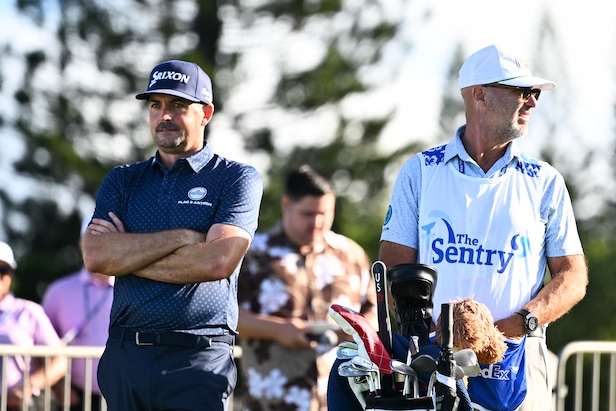Padraig Harrington has fond memories of Carnoustie—but a few dark ones, too – Australian Golf Digest

- by Admin
- July 22, 2024

Listen to the speech Padraig Harrington made at his induction to the World Golf Hall of Fame last month in North Carolina and it is obvious that what defines his life and career are relationships. His parents. His four older brothers. His wife. His sons. His caddies. His swing instructors. His long-time agent. All were paid their well-earned dues during the 52-year-old Irishman’s humorous and touching oration.
One other long-time Harrington association received a mention though, one he enjoys (mostly) with a place, a course and one hole in particular. It was at Carnoustie in 2007—where this week he will compete in his third Senior British Open Championship—that the eventual three-time major champion recorded the first of his two consecutive Open victories, a memorable and life-changing moment in any player’s career to be sure. But it was also at the often bleak, barren and desolate Angus links that a younger Harrington endured what remains one of the biggest disappointments of his golfing life.
“My relationship with Carnoustie isn’t as straightforward as you might think,” he admits. “As we head into the Senior Open, a lot of people have been saying to me that I must be looking forward to going back to where I won the Open. And I am. But hang on a minute. This is Carnoustie we’re talking about. No one goes there and thinks they have the course licked. So no, I’m not going there thinking I can handle anything it throws at me. I know only too well that every hole on the course, depending on the conditions, has something to fear.”
More from Golf Digest Golf Digest Logo Padraig Harrington: 5 great speed-boosting drills for aging golfers 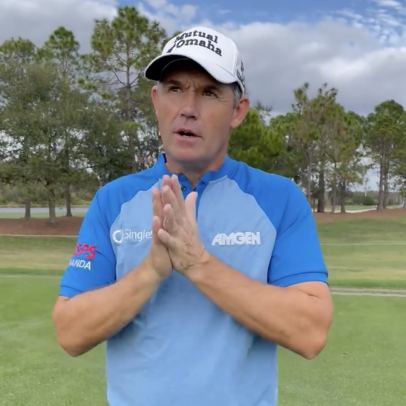 PNC Championship I asked Padraig Harrington for his ‘quick’ rollback take. He proceeded to speak for seven minutes straight
PNC Championship I asked Padraig Harrington for his ‘quick’ rollback take. He proceeded to speak for seven minutes straight 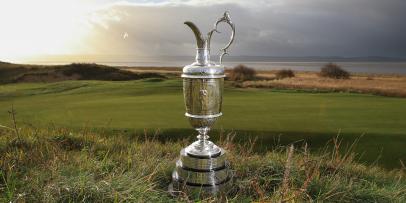 British Open 2024 The claret jug over 152 years: Triumphs, dents, hijinks and lots of drinking
British Open 2024 The claret jug over 152 years: Triumphs, dents, hijinks and lots of drinking
One hole, the already fearsome par-4 18th made legendary by Jean Van de Velde’s triple bogey at the 1999 Open Championship, sticks out, at least as far as Harrington is concerned. For him, that final hole represents the climax of a long-ago collapse that haunts him still.
At the 1992 British Amateur the then 20-year Dubliner arrived on the 16th tee 2 up on Scotsman (and eventual champion) Stephen Dundas in their Round-of-16 match.
“I was playing great on a course that really suited my style of game then,” says Harrington, who grew up as a relatively poor ball-striker armed with an exceptional short game. “So I was confident going into my match with Stephen.”
That ended up counting for nought. Harrington three-putted the tough par-3 16th to lose the hole. Back to 1 up. At the par-4 17th, he made 6 via the bunker short of the putting surface and lost out to Dundas’ bogey. All square.
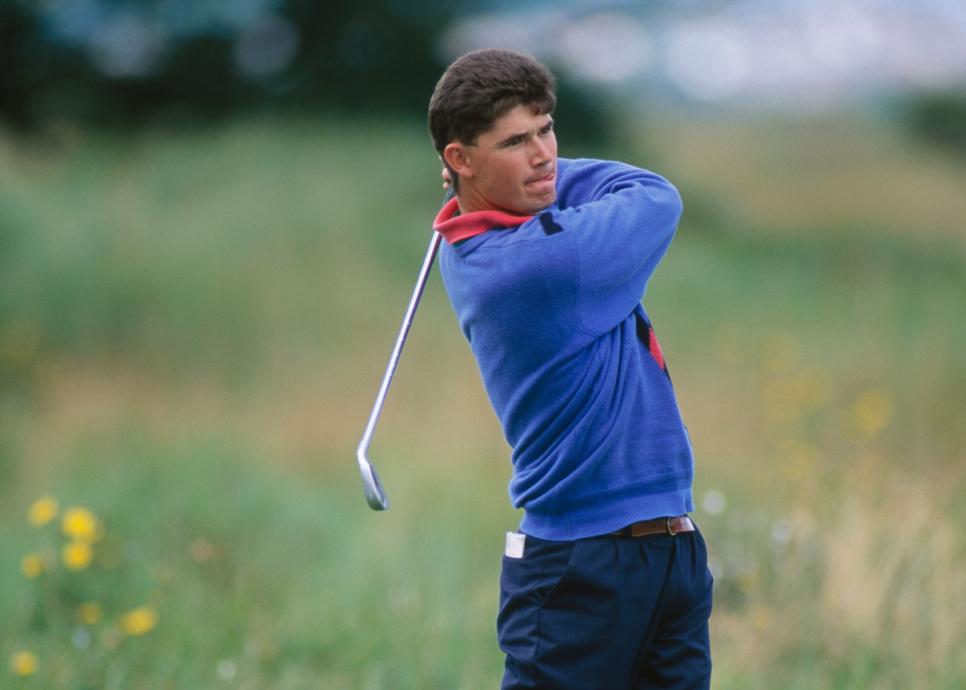
Harrington’s amateur career was impressive with spots on the 1991 and 1993 GB&I Walker Cup teams, but his loss at the 1992 British Amateur at Carnoustie was a heartbreaker.
David Cannon
“Off the 18th tee, Stephen hit a poor drive into the rough on the left,” Harrington recalls. “From there, he got lucky with his approach, which came up short of the burn in front of the green. I was hitting a 6-iron for my second shot. It was downwind and I hit it way too far, the ball eventually finishing out of bounds. Again, I lost the hole to a bogey. That was devastating.”
Fast forward 15 years and Harrington is again standing on the 18th tee, this time armed with a one-shot lead in the final round of the Open.
“So I have some history on the 18th,” he says with a smile, “which was in my head on the tee. But it wasn’t what you might think. I was actually over-confident. I’m best when I have a lot of fear. That narrows my focus. I take in everything, gather myself and hit the shot. But I was playing so well. I jumped onto the tee desperate to smash my ball down the middle. I had driven it perfect all day. But I had a momentary doubt. When I’m expecting doubt, it doesn’t bother me. But this was a shock. And it led to me hitting it way right into the water.”
What followed has stuck in Harrington’s perennially active mind to the extent that the aftermath of that errant drive made it into his Hall of Fame speech. This was going to be his Open. He’d had chances before, but this one was his. He was in control. Even after the bad drive he was resolute.
“But when I hit the next shot into the water, again, I lost it,” he admits. “I was trying not to hit it right. You couldn’t get up-and-down from over there. I didn’t want to hit it left either—out of bounds. So I hit a 4-iron trying to land it short of the green. But I duffed it. That was the first time in my career where I was embarrassed. I wanted the ground to swallow me up. The name Jean Van de Velde was going through my mind. You can’t play that hole without thinking about Jean.”
It was then that Harrington’s caddie, Ronan Flood, stepped up like never before—and surely has never had to since. Firing clichés at his friend and employer (“It’s not over yet. Let’s play it out. One shot at a time’), Flood was smart enough to remove the mis-firing 4-iron from Harrington’s hands.
“I was ready to wrap it round Ronan’s neck,” says a grinning Harrington. “I felt like I had lost the Open. I was devastated. Only after about 50 yards did I start listening to Ronan. By the time I got to my next shot I started to believe him. I ended up back in the zone. I was showing off. All because Ronan did his job. He believed in me before I did, although he did admit later to thinking I had lost the Open.”
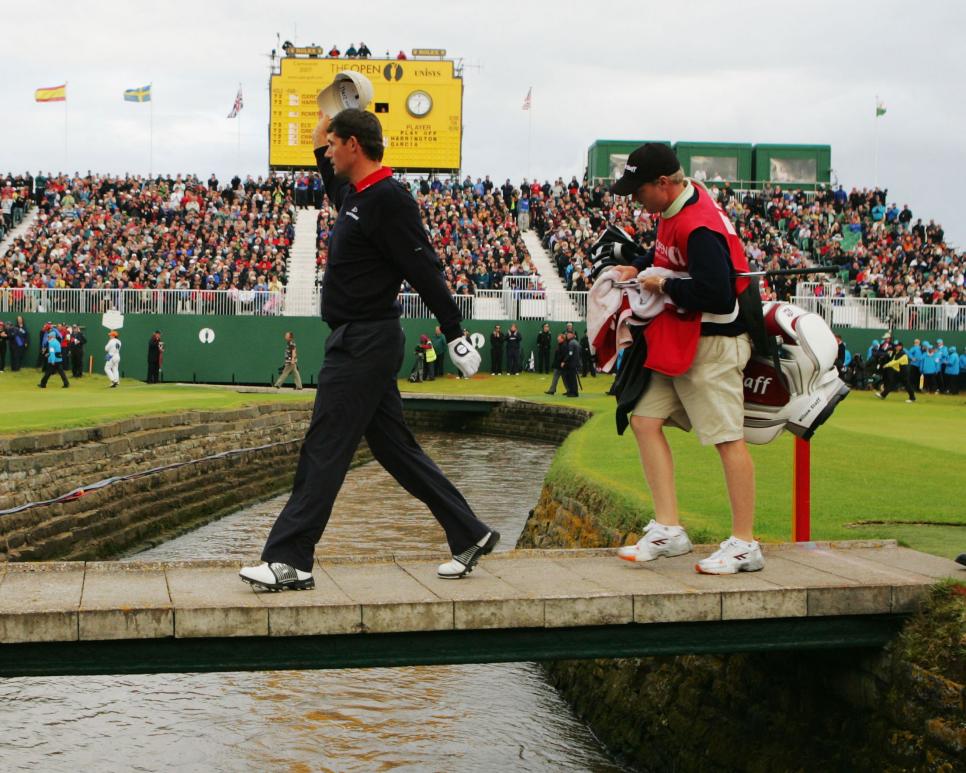
Harrington paised caddie Ronan Flood for his help in getting him through the final hole and the playoff at Carnoustie in 2007.
Andy Lyons
With a nifty up-and down for his second—but ultimately less disastrous—double bogey on Carnoustie’s 18th, Harrington got himself into a four-hole playoff with Sergio Garcia, one he would win. But even that wasn’t totally satisfying. The untidy manner of his victory lived on.
Asked months later if he was waking up in a cold sweat thinking about what could have happened on that 18th hole, Harrington admits that he was. But, as ever with this accounting graduate, his apparent concession of weakness is anything but straightforward. Redemption and release from his torment came one year later at Royal Birkdale.
“Yes, it was exciting to win,” he says. “But it left a mark. Two marks. If I hadn’t won the Open again in great style in 2008, there would still be an asterisk alongside my victory in 2007. There would always have been questions. I mean, you don’t dream of winning the Open by messing up the 72nd hole. But second time round I won by hitting the shots you would want to hit on the closing holes. It was all I could ever have wanted and validated my win at Carnoustie. My first Open victory was exciting; the second was satisfying.”
So how will Harrington feel when he returns this week, especially standing over his drive off the 18th tee? In the years since 2007, he has been to Carnoustie many times to compete in the pro-am that is the Dunhill Links Championship. But that is different from a major championship, especially one he has yet to win. In his Senior Open debut two years ago, Harrington finished one shot shy of champion Darren Clarke; 12 months ago he lost a playoff to Alex Cejka.
“The 18th has to be the toughest finishing hole in tournament golf,” he says. “The OB left of the green is so close. You can hit a decent shot, land on the green and finish out of bounds. That’s a bit too much for me. All of which, in my opinion, makes it the toughest finishing hole in golf. You won’t find one harder.
“But my first thought when I go back to Carnoustie is always the same: ‘how did I ever win on this course?’” he continues. “It really is such a great course. So many holes are brilliant and so hard. Take the par-3 eighth hole. Miss the green by five yards left and you are out-of-bounds. Or the 7th. People worry about the famous OB on the par-5 6th hole; I worry about it on the seventh. So I don’t play well there because I find the course easy. I play well there because it puts the fear of God in me.”
With good reason. Amidst all the great things, a dodgy precedent lingers within Harrington’s eventful and eventually satisfying relationship with Carnoustie. One hole in particular. For him, the mind games will never end.
This article was originally published on golfdigest.com
The Latest News
-
January 8, 2025‘Feels like a bit of a novelty’: Australian all-rounder Ash Gardner endorses three-Test women’s Ashes series
-
January 8, 2025‘Biggest test’ facing Healy amid injury comeback
-
January 8, 2025Channel Nine turns two Aussie sport superstars into tennis commentators for the Australian Open in a VERY surprising decision
-
January 8, 2025The best way to get to the Australian Open without driving
-
January 8, 2025Nick Kyrgios injury: Tennis star’s Australian Open return in doubt | Sporting News Australia





